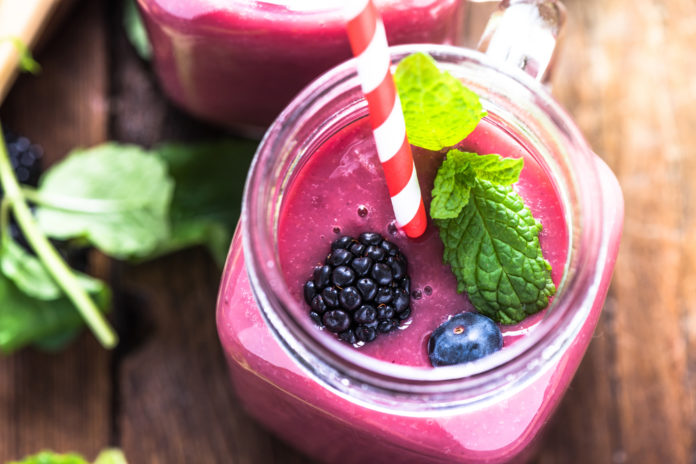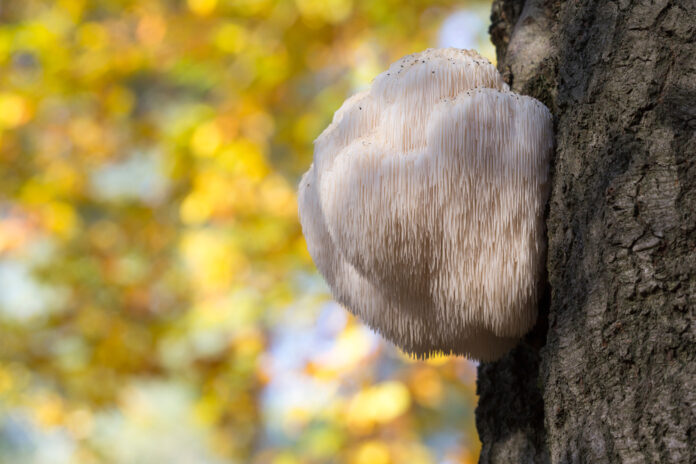Smoothies you can share with your dog

Smoothies are a delicious and refreshing way to boost nutritional intake. And with a few ingredient tweaks, you can also share them your dog!
Smoothies have become a nutritional mainstay for many people. Just toss some fresh fruits, veggies, nut milk, yogurt, or other ingredients into a blender, food processer or Magic Bullet, and voila – you have a flavorful drink that’s packed full of health-boosting vitamins and minerals. But here’s what makes smoothies even better – you can share them with your dog! Each of the following recipes can be prepared the same way you’d make your own smoothies (in fact, you and your human family will love them too!). They’re great as meal toppers for your dog, or pour them into ice cube trays, freeze them, then pop them out for refreshing summer treats. You can even use smoothies as a base for making healthy dog biscuits. Remember to use organic ingredients whenever possible.
Banana Split
1 banana
1 cup strawberries
1 cup yogurt (e.g. goat, sheep)
1/2 teaspoon pure vanilla extract
Nutrition notes
- Bananas are the perfect treat for dogs. Fresh or frozen, they are packed with vitamins and minerals, including copper, magnesium, manganese, and potassium, vitamins B6 and C. They are also a valuable source of fiber.
- Strawberries provide fiber, calcium, iron, magnesium, phosphorus, potassium, vitamins A and C, and folate. They have a high polyphenol content and their anthocyanin may help support heart health. Their high potassium content is beneficial too. Quercetin, a flavonoid found in strawberries, acts as a natural anti-inflammatory.
- Goat’s milk contains more B1, B2, B6, B12, biotin, folic acid, and pantothenic acid than cow’s milk, and is easier to digest due to the makeup of its protein, also known as casein. Goat’s milk contains a higher percentage of fatty acids than any other milk. Sheep’s milk is naturally homogenized and contains vitamins A, B, B1, B6, B12, C, D and E, along with calcium, magnesium, phosphorus, and zinc. It has ten essential amino acids, and twice the fat found in cow’s milk, including Omega-3 and Omega-6 essential fatty acids. Sheep’s milk is also rich in medium chain fatty acids. Its fat globules are small, making them easier to digest.
Berry Blast
1 banana
1 cup mixed berries (e.g. blueberries, blackberries, raspberries, strawberries)
1 cup almond milk
Splash of pure cranberry juice
Nutrition notes
- Blueberries contain two very important eye-healthy carotenoids, lutein and zeaxanthin. They also contain anthocyanins, eye-nourishing phytonutrients that support night vision. Flavonoids, such as rutin, resveratrol and quercetin, are found in blueberries, and may help prevent macular degeneration. Blueberries contain selenium and zinc, which also support vision.
- Almonds contain the entire vitamin E family and are also an excellent source of B vitamins, copper manganese, magnesium, zinc, bioflavonoids, and Omega 3 essential fatty acids.
- Cranberries contain a variety of bioactive components, including the antioxidants proanthocyanidins and anthocyanins, and ellagic acid. Anthocyanins give cranberries their rich red color, and have the strongest antioxidant power of 150 flavonoids tested; they’re even more powerful than vitamin E. Anthocyanins also have an anti-inflammatory action that can help lessen allergic reactions. Proanthocyanidins belong to the bioflavonoid family and help strengthen blood vessels and improve the delivery of oxygen to cell membranes. Ellagic acid has been found to cause apoptosis or “cell death” in cancer cells. Cranberries also contain dietary fiber, manganese, and vitamin K, and are rich in vitamin C and tannins, which help keep bacteria such as coli, the most common cause of urinary tract infections, from adhering to the walls of your dog’s urinary tract.
Carrot Crush
2 cups carrots, chopped
1 cup bone broth (homemade or store bought)
1 teaspoon local honey
1 teaspoon turmeric
1/2 teaspoon sea salt
Nutrition notes
- Carrots have over 100 varieties, from the deepest purple to the brilliant orange we are most accustomed to seeing. They contain pro-vitamin A (beta-carotene), vitamins B, C, D, E and K, as well as riboflavin, niacin, calcium, potassium, phosphorus, sodium, iron, magnesium, manganese, sulphur, copper, and iodine. Carrots also contain lycopene and lutein, protective phytonutrients that protect the eye from UVB radiation and damage from free radicals.
- Honey is packed with antioxidants and flavonoids. There is substantial evidence that honey, especially New Zealand’s Manuka honey, may be effective against Helicobacter pylori bacteria, which causes stomach ulcers. The UMF (Unique Manuka Factor) is an antibacterial property that is phytochemically derived and is found in some strains of Manuka honey. Honeys must be tested for this special antibacterial property. Some honeys are infused with fresh, sustainably-harvested herbs, like wild giant horsetail.
- Turmeric’s deep yellow pigment is the key to its medicinal properties. It provides essential disease-fighting compounds that help neutralize free radicals. Turmeric supports the liver, heart, and lungs. Its anti-inflammatory properties and antioxidants help provide relief from arthritis and other joint issues.
Cinnamon Carob Crunch
1 banana
1/2 cup almond powder (or combination of almond powder and almond butter powder)
1/2 cup carob powder
1 teaspoon cinnamon
1/2 cup almond milk
1/4 cup yogurt (e.g. goat, sheep)
Nutrition notes
- Carob is rich in natural sugars and contains all the principal minerals and vitamins, including thiamin, riboflavin, niacin, calcium, magnesium, and iron. Carob is great for calming an upset tummy, and for curbing diarrhea.
- Cinnamon can help treat a variety of gastrointestinal problems, including nausea and flatulence. The oil found in cinnamon has antifungal and antibacterial properties.
Great Greenie
1 cup kale
1 cup mixed dark leafy spring greens (e.g. collard, dandelion, spinach, Swiss chard, bok choy)
1/2 teaspoon sea salt
1/2 teaspoon kelp powder
1/2 teaspoon Chaga mushroom powder
2 cups bone broth
Nutrition notes
- Kale is an excellent source of lutein and zeaxanthin. The American Optometric Association says that these special antioxidants act like “internal sunglasses.”
- Kelp is the richest single source of trace minerals. The pituitary, adrenal and thyroid glands benefit from these trace minerals. Kelp supports the immune system, helps regulate blood sugar levels, soothes the gastrointestinal tract, and may alleviate joint pain. Consider dulse, kombu, Nori, wakame, and Irish moss too. Look for sustainably-harvested, sun-dried, OCIA (Organic Crop Improvement Association) standard sea vegetables that have been tested for heavy metals, herbicides, pesticides, PCBs, fuel oil, and other contaminants.
- Chaga mushrooms help boost immunity and overall health. Studies have suggested that Chaga extract promotes the formation of beneficial cytokines. it helps reduce long-term inflammation, and fights bacterial infections and viruses. Chaga also contains an antioxidant called triterpene; studies have demonstrated that this extract may help kill cancer cells. Chagas are wild harvested in Canada, Northern Europe, Russia, Siberia, Korea, and Alaska. In Canada, they are sustainably harvested, meaning only larger Chaga mushrooms are taken, leaving some behind so the host tree will continue to thrive and more mushrooms will grow. They are taken only from living birch trees.
Soothing Smoothie
1/2 cup slippery elm
1 tablespoon carob powder
1 teaspoon cinnamon
1/2 teaspoon ground ginger
1½ cups applesauce with no added sugar
Nutrition notes
- Slippery Elm (Ulmus fulva) is one of the greatest remedies for digestive disorders in the plant kingdom. When the bark is mixed with goat’s milk or yogurt, it lines the gut and intestines, protecting the mucous membranes from irritation. Slippery elm contains both tannins and mucilagens, which have both astringent and anti-inflammatory properties. It is also interesting to note that slippery elm is one of the herbs included in the original Essiac formulation, developed to fight cancer.
- Ginger is recognized as the best anti-nausea herb and is well tolerated by dogs. It acts as a digestive tonic, relieving stomach aches and intestinal gas. It also stimulates the digestive juices and helps expel worms.
- Apples, especially red apples, are rich in antioxidants. They are heart smart, and studies have shown that a diet rich in red apples helps in our battle against cancer by inhibiting the growth of malignant cells. One red apple is the equivalent of about 1,500 mg of vitamin C. Red apples, along with other colourful fruits and vegetables, contain the phytochemicals, lycopene and anthocyanins. Along with lots of vitamin C, red apples contain calcium, chlorine, fluorine, iron, magnesium, phosphorus, potassium, silicon, sodium, and sulphur, along with many trace minerals. Red delicious, northern spy, and Ida red apples have more potent disease-fighting antioxidants than other varieties, which is reflected in their higher levels of polyphenol activity.
Herbaceous Herbie
1/2 cup fresh flat Italian or curly parsley
1/2 cup fresh mint leaves
1 teaspoon fresh oregano leaves
1 cup applesauce
2 teaspoons horsetail-infused or local honey
Splash of unfiltered or first pressed/extra virgin olive oil
Nutrition notes
- Parsley is rich in vitamins A, C, and K, iron, folate, and numerous minerals. It contains a variety of volatile oils, including myristin, which is thought to inhibit tumor formation, especially in the lungs; and histadine, an amino acid that has also been found to inhibit tumor growth. Parsley is referred to as a chemoprotective food because it may help neutralize a variety of carcinogens, including the benzopyrenes found in cigarette smoke.
- Mint, including wild mint, catmint, spearmint, and peppermint, can be included in your dog’s diet. In combination with ginger, mint has long been considered soothing to the gastrointestinal system.
- Oregano is often referred to as the “cure in the cupboard.” It contains calcium, fiber, iron, manganese, Omega-3 fatty acids, and vitamins A, C, and K. It also contains phytonutrients and the volatile oils, thymol and carvacrol, which inhibit the growth of bacteria. Oregano is packed with antioxidants; even moreso than apples and blueberries.
- Olive oil is a very rich source of vitamins A and E, helping to neutralize cancer-causing free radicals. It is also rich in Omega-9 oleic acid, a mono-saturated fat that helps protect the heart and supports skin health. When you purchase olive oil, ensure the label says “extra virgin,” which means it has come from the first pressing of the olives; it has the most health benefits and the best taste.



